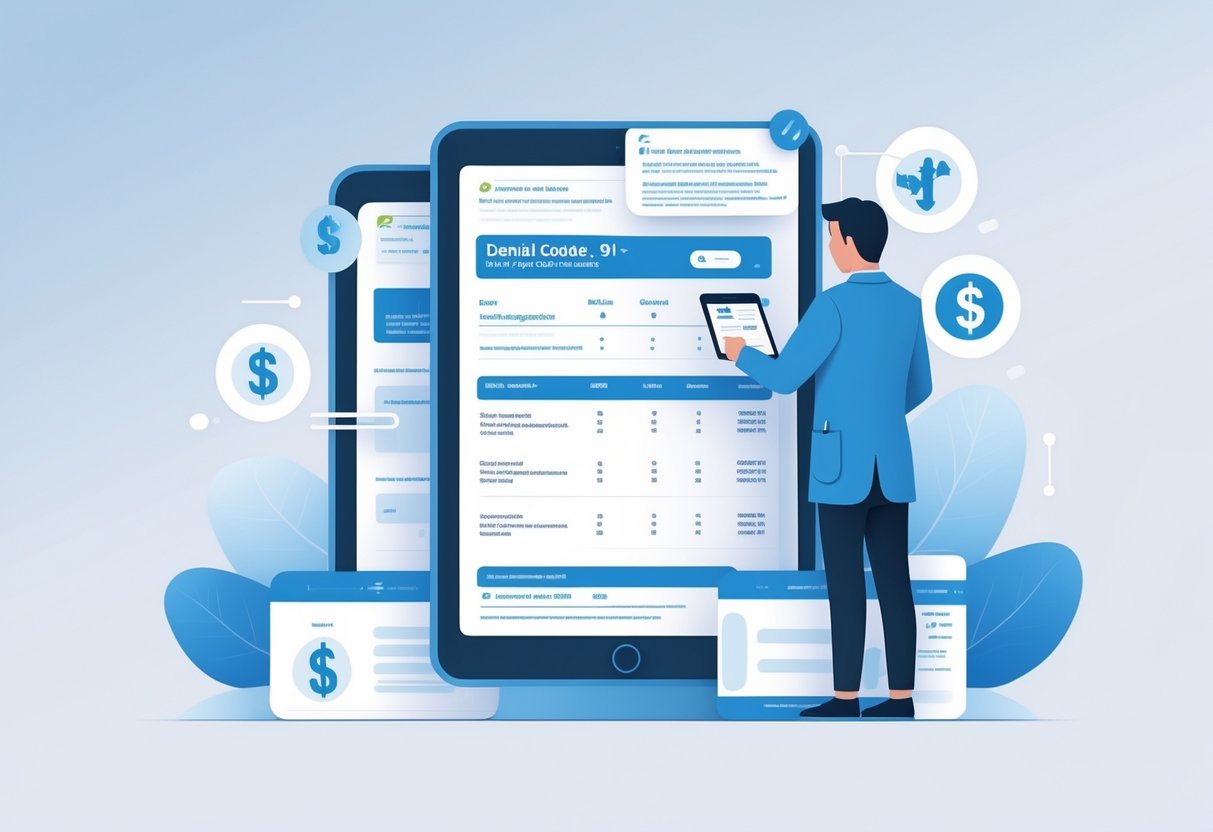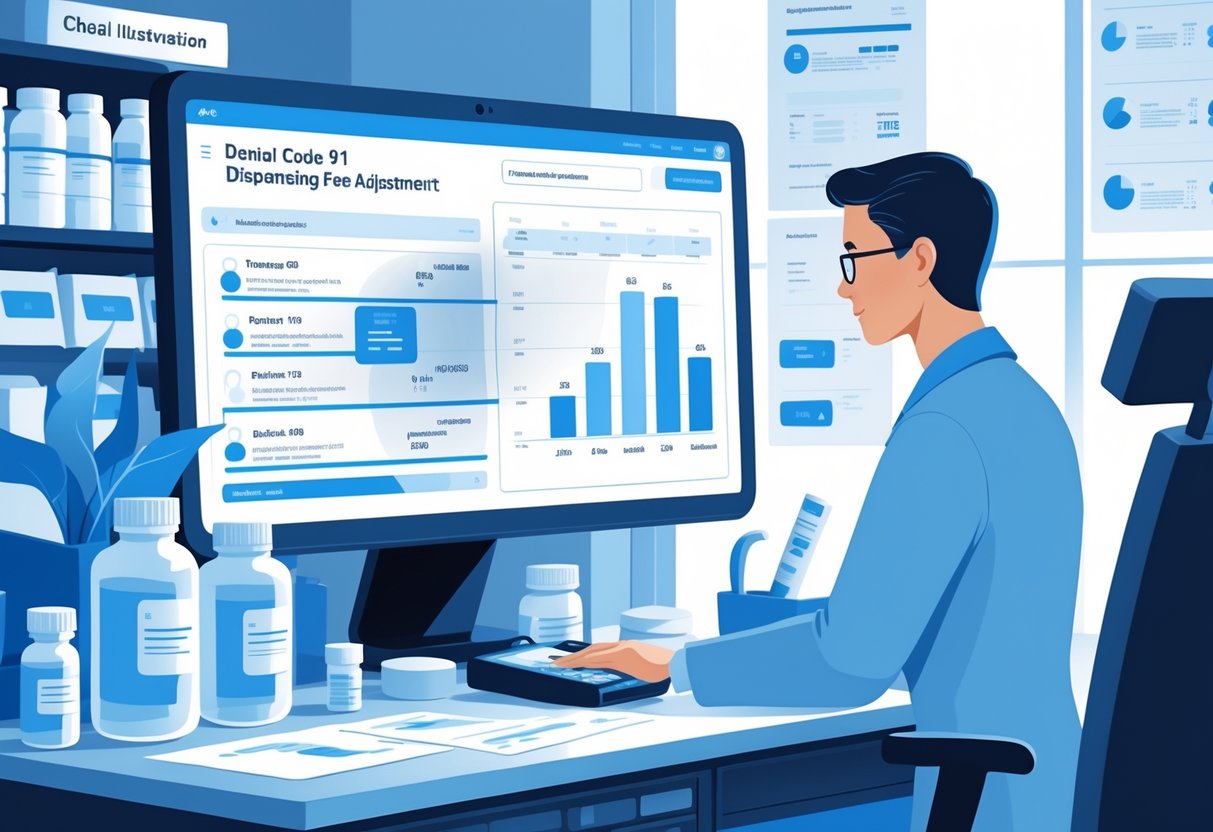Denial code 91 means there is a problem with the dispensing fee adjustment on a pharmacy claim. This code indicates that the fee you charged for dispensing medication was either incorrect or not allowed. Understanding this can help you fix the issue and get your claim paid.
When you see denial code 91, it usually means the insurance company needs the dispensing fee to match their approved rate. If your fee is too high or not supported by the plan’s rules, the claim will be denied.
Knowing why this denial happens helps you check the fees you enter and adjust them correctly. That way, you avoid delays and improve your chances of getting paid faster.
Understanding Denial Code 91 – Dispensing Fee Adjustment

Denial Code 91 deals with changes to the dispensing fee originally charged. It targets specific billing errors or policy requirements that affect the fee your pharmacy can claim.
Definition and Purpose
Denial Code 91 means an adjustment was made to the dispensing fee on your claim. The dispensing fee is what you charge for preparing and giving out a prescription.
This code appears when the payer thinks your fee needs to be lowered or changed. It helps ensure fees meet set rules or contracts.
The purpose is to catch errors such as charging for services not covered, using incorrect fee amounts, or billing multiple fees incorrectly.
How Denial Code 91 is Applied
Payers apply Denial Code 91 when your submitted dispensing fee goes against their policies. They review your claim during the payment process.
If your fee is too high or does not match their allowed amount, they adjust it down. Sometimes they deny the fee completely.
The code is a way to inform you of this adjustment. You can then check if you billed correctly or if you need to appeal.
Common Scenarios Leading to Adjustments
You might see Denial Code 91 when you charge the wrong fee level. Some contracts set specific fixed fees, and charging above results in adjustment.
Another situation is billing a dispensing fee for items like refills or free samples which the payer doesn’t allow.
Billing multiple dispensing fees for one prescription fill can also trigger this code. Always verify your billing matches contract terms.
Use the code as a prompt to review your dispensing fee charges carefully to avoid repeated adjustments.
Causes of Dispensing Fee Adjustments

Dispensing fee adjustments happen when the amount requested for payment does not match what the insurer allows. This can result from errors in billing, limits set by the insurance policy, or when claims are submitted more than once.
Billing Errors
Billing errors are common causes of fee adjustments. If you enter incorrect codes or amounts on the claim form, the insurer might reduce the fee. This includes mistakes like using a wrong drug code or missing necessary information.
Sometimes, you might bill a fee that is higher than what the insurer’s fee schedule allows. In such cases, part of the fee may be adjusted or denied. It’s important to double-check every detail to avoid these issues.
Insurance Policy Limitations
Your insurance policy may set limits on the dispensing fees it will cover. These limits can be based on the type of medication, quantity dispensed, or pharmacy location. If your requested fee exceeds these limits, the insurer adjusts the amount.
Some policies apply special rules for certain drugs, like generic versus brand name, which affect the dispensing fee. Understanding these limits helps you bill accurately and reduces the chance of fee adjustments.
Duplicate Claims
Submitting the same claim more than once can cause a dispensing fee adjustment. Insurers track claims to prevent multiple payments for the same service. If you send in a duplicate claim, the second one will often be adjusted or denied.
Duplicate claims might result from resubmissions done without corrections or claims sent from different billing systems. Keeping clear records and checking previous submissions help you avoid these problems.
Resolving Denial Code 91 Issues
To fix Denial Code 91, you need to check your payment details carefully, correct any mistakes in your claims, and know how to file an appeal if needed. Each step requires close attention to specific information related to dispensing fees.
Reviewing Remittance Advice
Start by examining your remittance advice closely. This document shows why the claim was denied and outlines the exact amount paid versus the amount billed.
Look for notes about dispensing fee adjustments. They often show if the fee was reduced or removed due to plan rules or fee limits.
Compare the dispensing fee you charged with the plan’s allowed fee. This helps identify if your fee was too high or submitted incorrectly.
Keep track of any patterns of denial. Consistent issues mean you might need to double-check your pricing or contract terms with payers.
Correcting Claim Submissions
When fixing claims, ensure the dispensing fee matches the payer’s allowed amount and coding rules.
Double-check all fee codes and amounts before resubmitting. Errors in these fields cause denials under Code 91.
Make sure you submit claims within the allowed timeframe. Late submissions are often rejected without payment.
Use the payer’s guidelines to accurately report dispensing fees. Some plans have specific billing methods or limits that differ from standard charges.
Appeal Process for Denial Code 91
If you believe your dispensing fee was denied incorrectly, you can file an appeal.
Gather proof such as your contract details, pricing agreements, and original claims with supporting documents.
Submit the appeal using the payer’s required form or online system. Include a clear explanation of why the fee should be paid as billed.
Track the appeal carefully. Follow up if you do not receive a response within the stated timeframe, and provide additional info if requested.
Prevention Strategies for Future Claims
To avoid denial code 91, focus on accurate billing, proper staff training, and using technology to catch errors early. Clear policies and checks make it easier to submit clean claims and reduce disputes over dispensing fee adjustments.
Best Practices in Pharmacy Billing
You should review all dispensing fees against payer guidelines before submitting claims. Make sure the fees you charge match the contracts with insurance companies or third-party payers.
Use standardized claim forms and double-check for common mistakes like incorrect fee amounts or missing data. Keep detailed records to explain any fee adjustments if questioned later.
Create a checklist for each claim that includes verifying the dispensing fee and confirming eligibility for adjustments. This reduces the chance of simple billing errors causing denials.
Staff Training and Compliance
Train your staff on the specific rules about dispensing fee adjustments. Everyone handling billing must know what qualifies as an allowable fee and how to document it properly.
Regular refresher courses help keep the team updated on changes in payer policies. Ensure that your staff understands the consequences of errors on claim approval rates.
Encourage open communication so staff can ask questions or report unclear situations. Compliance improves when your team feels supported and well-informed.
Utilizing Technology for Error Reduction
Use pharmacy management software that flags incorrect dispensing fee entries before claims are sent. Automated checks can catch errors faster than manual reviews.
Implement tools that match your billing data with payer rules automatically. This prevents submitting claims with unauthorized fee adjustments.
Technology can also generate reports showing patterns in denied claims. You can use these insights to fix problems early and avoid repeating mistakes.
Impact of Denial Code 91 on Pharmacies and Providers
Denial code 91 affects how pharmacies and providers get paid for dispensing fees. It can change the money they receive, cause extra work, and affect how patients feel about their service.
Financial Implications
When you see denial code 91, it means the dispensing fee you billed may be reduced or rejected. This lowers your expected income from insurance claims.
You might have to absorb these lost fees or try to resubmit claims with correct information. This could mean fewer profits or extra costs. Over time, repeated denials add up and hurt your bottom line.
Pharmacies often deal with smaller reimbursements. Providers may need to adjust billing practices to avoid similar issues. Tracking these denials helps you manage your revenue better.
Workflow Disruptions
Dealing with denial code 91 slows down your daily tasks. You have to check claim details, fix errors, and contact payers. This extra step takes time away from serving patients.
Staff may spend hours correcting claims or filing appeals. This increases workload and pressure on your pharmacy or office team. Delays in payment also make it harder to manage cash flow.
You might need to train your team on how to prevent or resolve these denials. This can improve processes but adds initial work and requires ongoing attention.
Patient Satisfaction Consequences
Patients notice when their prescriptions are delayed or when costs change. If you must resubmit claims or request more information, patients might wait longer for their medicine.
Denial code 91 could lead to confusion about copays or charges. Patients could feel frustrated if they think the pharmacy or clinic made a mistake.
Clear communication helps reduce misunderstandings. You should explain why delays happen and what steps you’re taking. This can keep patients trusting your service despite billing problems.
Frequently Asked Questions
Denial code 91 occurs when there is an issue with the dispensing fee on your pharmacy claim. This often involves adjustments that do not meet payer rules or limits.
What does it mean when a claim is rejected due to a dispensing fee adjustment?
It means the amount charged for the dispensing fee was changed by the payer. The adjusted fee may be lower than what you billed.
How can a pharmacy resolve a denial code 91 related to dispensing fees?
You need to review the payer’s fee schedule and billing rules. Resubmit the claim with the correct dispensing fee or appeal if you believe the adjustment was incorrect.
Are there specific documentation requirements to contest a denial code 91?
Yes. You should provide proof of your usual dispensing fee rates and any contracts or agreements with the payer. Detailed invoices or billing manuals may also help.
What are common reasons for receiving a denial code 91 on a pharmacy claim?
Errors in the billed dispensing fee, billing above allowed limits, or missing prior authorization can cause this denial. Also, discrepancies between your fee and the payer’s allowed fee trigger it.
Can denial code 91 be prevented, and if so, how?
Yes. Check your payer’s fee schedules regularly. Always submit claims with dispensing fees that match those schedules and keep clear records.
Under what circumstances can a dispensing fee be adjusted leading to a denial code 91?
Adjustments happen if the fee exceeds payer allowances or if billing rules require a lower fee. Fee caps, changes in contract terms, or incorrect fee coding also cause adjustments.








1 thought on “Denial Code 91 – Dispensing Fee Adjustment Explained and How to Resolve It”